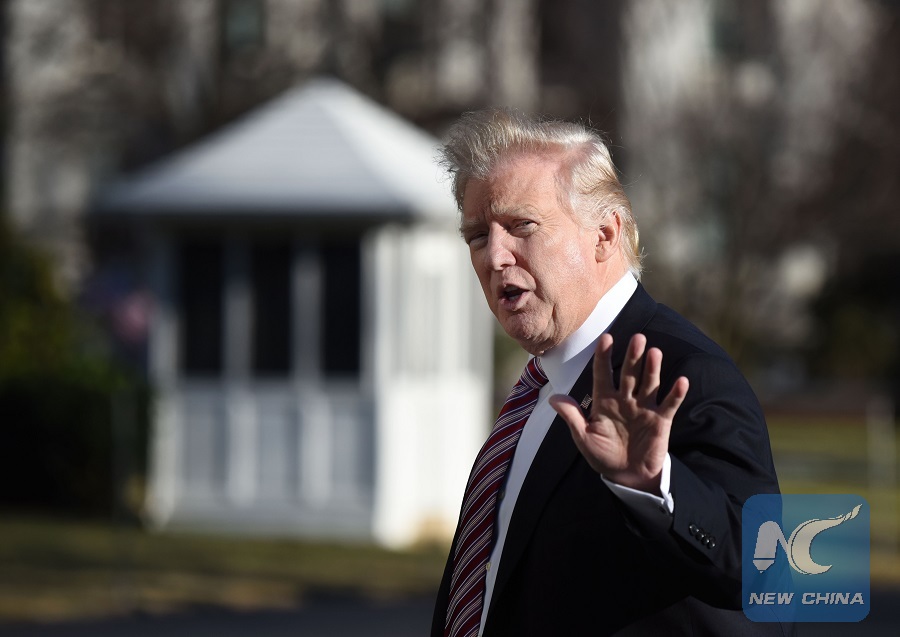
U.S. President Donald Trump waves upon his arrival at the White House from Philadelphia, in Washington D.C., the United States, on Jan. 26, 2017. (Xinhua/Yin Bogu)
LONDON, Jan. 27 (Xinhua) -- As British Prime Minister Theresa May becomes the first foreign leader to meet new U.S. President Donald Trump, Britain's ties with the U.S. is set to prosper under the Trump presidency, British experts have said.
"That Trump is meeting May is significant," Robert Busby, senior lecturer in politics and an expert on American politics with Liverpool Hope University, said in an interview with Xinhua.
Such a special relationship, however, could become more of an illusion if Trump forges a new relationship with Russia or if he acts in a way alien to British public and political opinion,
Busby said he expects the British-U.S. ties to prosper following two terms of Barack Obama in the White House.
"Trump was supportive of Brexit and saw that movement as being indicative of a greater anti-globalism concern among voters, which could be replicated in the U.S.," he said.
The reinforcement of close relations with Britain, he said, would also resurrect the Reagan-Thatcher memories that were fondly remembered by U.S. Republicans in particular.
Britain and the U.S. had enjoyed close relations in the 1980s, under the leadership of Margaret Thatcher and Ronald Reagon.
"There are perceptions that Britain may become isolated after Brexit. (But) the message from Trump is that there are old relationships that can be rediscovered," Busby said.
Trump's meetings with Nigel Farage, former leader of British political party UKIP, and now May are testament to a sympathy for British ideas and legacies, he said.
Busby said while there are opportunities for Britain following Brexit with a sympathetic president in place, there may be greater problems in getting concrete actions, particularly in the short term.
"The Brexit process, as has been shown, will be a slow and arduous procedure," he said.
May has indicated that Britain will trigger Article 50, the formal procedure by which an EU member state notifies the European Council that it intends to leave the block, by the end of March.
Once triggered, Article 50 requires "divorce" negotiations to be completed within two years.
According to Busby, it will take some time to get trade deals enacted with the U.S., and this is not in Trump's hands alone as there will be a need for support from the U.S. Congress.
"Trump's interest is not in ensuring that the UK has a post-Brexit ally per se, but rather that American jobs are created and that there are markets for American goods," he said.
Britain may find itself in a trade deal, but not necessarily one where it holds the advantage in comparison with a much bigger and more powerful economy, he warned.
"I don't think that we can assume that Trump-May will evolve into a Reagan-Thatcher relationship," Busby said.
"Trump, a recent convert to the Republican party, seems much more pragmatic in his approach to politics, and May will be expected to use her opportunities in forging a relationship to hold Trump to account in some of his more controversial policy areas.
"I'd expect a warm association between the two, but a much more business like relationship as opposed to the personal friendship of Reagan and Thatcher. Inevitably however constant comparisons will be made," Busby said.
There may be a period when both countries have an immediate need for one another -- Britain to look beyond the shockwaves of Brexit, while Trump to have a strong global ally in a world where there is uncertainty.
"This however could be short term," he warned.
If new relationships are forged between the U.S. and Russia, or if Trump acts in a way that is alien to British public and political opinion, then the special relationship may well be more of an illusion than a hard practicality which would benefit both nations, he said.
Prof. Patrick Minford, a global expert in macroeconomics, was a special adviser to Thatcher, famed for her close working relationship with former U.S. President Ronald Reagan.
Minford, Professor of Applied Economics at Cardiff Business School of Cardiff University, told Xinhua the Trump-May relationship could easily match that of the Reagan-Thatcher era.
"I believe the Trump-May relationship will work well in the same way there was a chemistry between Reagan and Thatcher.
They were complete opposites between Reagan and Thatcher. They could not have been more different.
"Similarly with Trump and May, there is a coincidence of interests, problems and approaches, and two very different people.
"We are going for free trade options to satisfy our citizens left out of the process of globalization. It is because of an absence of free trade, caused as a result of the EU's protectionist policies in things such as agriculture.
"Trump is facing the problem of illegal immigration and areas such as Detroit being denuded of jobs. What we could see is a trickle down effect because of his approach to the problems America faces.
"The U.S.-UK coincidences continue, with both countries wanting fast moving economies, cuts in regulations and curbing unskilled immigration. It could lead to an improvement in the economies of both, more of a tremendous storm than a perfect storm."
Minford predicted there will be a free trade agreement with the U.S. under the Trump presidency, backed by the fact Britain pays its way on defense and the fact both countries are already good allies.
Britain is not seen as a threat to America since the two nations are complimentary allies. On the other hand, Trump might be tough on mainland Europe, he said.
"Of course he needs to tread carefully in respect of the North American Free Trade Agreement because of the importance of the supply chain. He may have to put some stuff on hold," Minford added.

